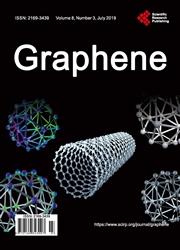Graphene-Polymer Nanocomposites and Roll-to-Roll (R2R) Compatible Flexible Solid-State Supercapacitor Based on Graphene Nanoplatelets and Ionic Liquid-Polymer Gel
引用次数: 2
Abstract
We present the electrical and supercapacitive performance of graphene nanoplatelets in polymer nanocomposites and flexible solid state electrical double layer capacitors (EDLC) respectively. Graphene-doped poly (3,4-ethylenedioxythiophene) (PEDOT) coated polyethylene terephthalate (PET) and glass exhibited transmittance above 95% and electrical conductivity of 2.70 × 10−1 S∙cm−1 and 9.01 × 10−1 S∙cm−1 respectively. Graphene loaded polymethyl methacrylate (PMMA) and polystyrene (PS) nanocomposites showed electrical conductivity as high as 2.11 × 10−1 S∙cm−1 at low loadings of 2 wt%. The use of graphene was necessitated by the need to increase the EDLC capacitance and energy density since it provides high effective surface area. The polymer gel membrane made from polyvinylidene fluoride-co-hexafluoropropylene (PVDF-co-HFP) and the Ionic Liquid (IL) 1-butyl-3-methylimidazolium hexafluorophosphate exhibited high porosity which made it suitable for use as separator in the EDLC. The highest recorded specific capacitance was 133.82 F/g which can be attributed to the porosity of the IL containing PVDF-co-HFP membrane and the large surface area of the graphene electrodes. At an operating voltage of 3.5 V the energy density was found to be 56.92 Wh∙Kg−1. All chemicals were research grade and were obtained from Sigma Aldrich.基于石墨烯纳米片和离子液体-聚合物凝胶的石墨烯-聚合物纳米复合材料和卷对卷(R2R)兼容柔性固态超级电容器
我们分别介绍了石墨烯纳米片在聚合物纳米复合材料和柔性固态双电层电容器(EDLC)中的电学性能和超级电容性能。石墨烯掺杂聚(3,4-乙烯二氧噻吩)(PEDOT)涂层聚对苯二甲酸乙二醇酯(PET)和玻璃的透过率均在95%以上,电导率分别为2.70 × 10−1 S∙cm−1和9.01 × 10−1 S∙cm−1。石墨烯负载的聚甲基丙烯酸甲酯(PMMA)和聚苯乙烯(PS)纳米复合材料在低负载2 wt%时的电导率高达2.11 × 10−1 S∙cm−1。石墨烯的使用是必要的,因为需要增加EDLC的电容和能量密度,因为它提供了高的有效表面积。由聚偏氟乙烯-共六氟丙烯(PVDF-co-HFP)和离子液体(IL) - 1-丁基-3-甲基咪唑六氟磷酸制成的聚合物凝胶膜具有高孔隙率,适合用作EDLC的分离器。记录的最高比电容为133.82 F/g,这可归因于含IL的PVDF-co-HFP膜的孔隙率和石墨烯电极的大表面积。在工作电压为3.5 V时,能量密度为56.92 Wh∙Kg−1。所有化学物质均为研究级,均来自Sigma Aldrich。
本文章由计算机程序翻译,如有差异,请以英文原文为准。
求助全文
约1分钟内获得全文
求助全文

 求助内容:
求助内容: 应助结果提醒方式:
应助结果提醒方式:


